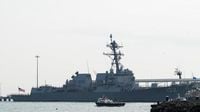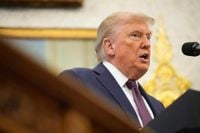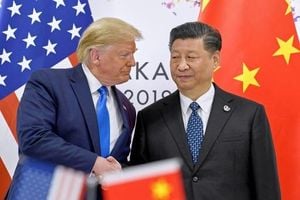On a crisp Saturday afternoon in Minneapolis, the usually quiet Mayday Plaza pulsed with the sound of drums, chants, and impassioned speeches as around 50 demonstrators gathered to protest what they described as escalating U.S. aggression toward Venezuela. The October 4, 2025 rally, organized by the Minnesota Anti-War Committee, was a direct response to a series of recent U.S. military actions in the Caribbean that have drawn international condemnation and ignited fierce debate at home and abroad.
At the heart of the protest were allegations that the Trump administration had intensified its campaign against Venezuela, deploying warships and thousands of troops to the nation’s coast since late August. According to reports cited by Fight Back! News and venezuelanalysis.com, at least four Venezuelan fishing boats were struck by U.S. forces during this period, resulting in the deaths of more than 20 civilians and the illegal boarding of one vessel. The U.S. government has justified these actions by claiming the boats were involved in drug trafficking—a charge Venezuelan officials and their supporters vehemently deny.
“There is absolutely no proof that any substantial amount of drugs that reach the U.S. are coming from or passing through Venezuela,” declared Shawn Rodine of the Minnesota Anti-War Committee to the crowd, referencing findings from both the U.S. Drug Enforcement Agency (DEA) and the UN Office on Drugs and Crime (UNODC) that Venezuela is not a significant source of global drug flows. “Organizations such as the DEA and the UN have published documents saying little to no drug trafficking or production is occurring in Venezuela. But that hasn’t stopped the Trump administration from shamelessly lying while playing judge, jury and executioner.”
The protest in Minneapolis was just one node in a rapidly expanding web of international concern. On October 10, 2025, Venezuela itself called an emergency session of the United Nations Security Council (UNSC) to address what it described as imminent U.S. military threats in the Caribbean. During the session, Russian Ambassador Vasily Nebenzya, who currently presides over the UNSC, issued a stark warning: “If there is an attack against Venezuela, it could affect the entire region.” He condemned the U.S. strikes as “flagrant violations of international law and human rights.”
China’s Ambassador to the UN, Fu Cong, echoed these sentiments, labeling the U.S. actions as “unilateral and excessive” and urging Washington to “heed international calls for peace and stability in the region.” He further repudiated the use of force in international relations and foreign meddling in Venezuela’s affairs. The chorus of criticism was joined by Miroslav Jenča, Assistant Secretary-General for Europe, Central Asia and the Americas, who called for de-escalation and a return to international norms.
Despite these appeals, the Trump administration has doubled down on its stance. U.S. Ambassador to the UN John Kelley defended the military build-up and strikes, insisting that the U.S. would not allow itself to be “flooded” by drugs and reiterating Washington’s longstanding accusation that the Maduro government is “illegitimate.” The administration has gone so far as to offer a $50 million bounty for information leading to the arrest of President Nicolás Maduro, and has declared a “non-international armed conflict” against drug cartels designated as terrorist organizations.
Behind these actions lies a controversial legal framework. According to a CNN report, the Trump administration recently produced a top-secret legal opinion from the Justice Department’s Office of Legal Counsel, authorizing the use of deadly force against a broad range of drug cartels—well beyond those officially designated as terrorist groups. The document reportedly argues that the president can authorize military action against any group deemed an imminent threat to the American people, a position that some legal experts find deeply troubling.
Sarah Harrison, a former associate general counsel at the Defense Department, told CNN that if the opinion is “as broad as it seems, it would mean DOJ has interpreted the president to have such extraordinary powers that he alone can decide to prosecute a war far broader than what Congress authorized after the attacks on 9/11.” She added, “By this logic, any small, medium or big group that is trafficking drugs into the US – the administration could claim it amounts to an attack against the United States and respond with lethal force.”
Not everyone in Washington is comfortable with this approach. Multiple Pentagon military lawyers have reportedly raised concerns that the attacks on boats off Venezuela’s coast “do not appear lawful,” but they lack the authority to override the Justice Department’s opinion. “The way forward is just to eat it and put your head down and act in accordance with [Secretary of War Pete] Hegseth’s new policies,” one lawyer was quoted as saying.
For many Venezuelans and their allies, the U.S. actions are seen as little more than a pretext for regime change and a grab for the country’s vast oil reserves. Venezuelan Ambassador to the UN Samuel Moncada didn’t mince words during the Security Council session, declaring, “There is a killer lurking in the Caribbean, looking for excuses to fabricate a conflict. The US government has already issued a secret order authorizing the use of military force in foreign territories.” He called on the Security Council to take steps to prevent further deterioration and to respect Venezuela’s sovereignty.
Back in Minneapolis, speakers drew connections between U.S. actions in Venezuela and broader patterns of interventionism. Nadiyah Salawdeh from the U.S. Palestinian Community Network remarked, “With their words, empires lie to the world, but with their actions they show the truth. When Colin Powell got up in front of the United Nations and lied about weapons of mass destruction, he did it so the U.S. empire could deepen its hold on west Asia… They don’t care about drug trafficking, they just want a reason to exploit Venezuela and to kill Venezuelans.”
The consequences of these policies, critics argue, extend far beyond the battlefield. U.S. sanctions, which demonstrators say kill half a million people worldwide each year by blocking access to medical supplies, farming equipment, and food, have exacerbated humanitarian crises and forced many Venezuelans to flee their homeland. Manuel Pascual from the Minnesota Immigrant Rights Action Committee emphasized, “When bombs drop and economies collapse, people are forced to flee. Venezuelans are crossing borders because survival demands it.”
In response to the military build-up, the Maduro government has launched large-scale defense exercises and reinforced its borders, both terrestrial and maritime. President Maduro has also called for renewed dialogue with the U.S., though the Trump administration has reportedly suspended all diplomatic contact.
As the crisis deepens, the voices from Mayday Plaza to the halls of the United Nations are united in their call for restraint, respect for sovereignty, and an end to what they see as a dangerous and unnecessary escalation. Whether Washington will heed these calls—or continue down its current path—remains to be seen.






